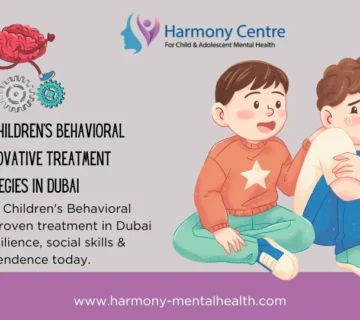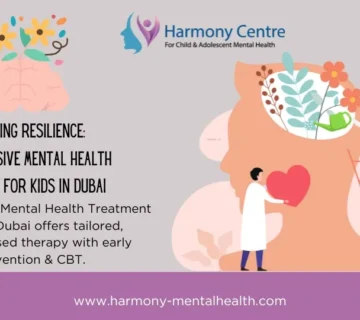Child Psychiatric Support Dubai: Expert Comprehensive Care for Young Minds at Harmony Centre
Discover child psychiatric support in Dubai at Harmony Centre. Our multidisciplinary, evidence‑based approach ensures comprehensive care for children facing mental health challenges.
Contact Information
| Contact Method | Details |
|---|---|
| Phone | +971 (52) 8773268 / 04 558 2015 |
| Click Here | |
| info@harmony-mentalhealth.com | |
| Address | Office 409, Building Alrazi-64C, 26th St, Healthcare City, Dubai |
Introduction
In a dynamic city like Dubai, where the demands of modern life can be overwhelming, children sometimes struggle with mental health issues that require specialized attention. At Harmony Centre Mental Health Dubai, our child psychiatric support services are designed to provide comprehensive care for young minds. We combine the expertise of child psychiatrists, psychologists, and other specialists to deliver evidence‑based treatments tailored to the unique needs of each child. Our goal is to foster resilience, improve emotional well‑being, and empower children to thrive academically, socially, and personally.
Learn More About Harmony Centre • Contact Us
Understanding Child Psychiatric Support
What Is Child Psychiatric Support?
Child psychiatric support encompasses the assessment, diagnosis, and treatment of mental health disorders in children and adolescents. This specialized care addresses conditions such as anxiety, depression, ADHD, and behavioral disorders through a combination of medication management, psychotherapy, and supportive counseling.
Key Components of Psychiatric Support
- Comprehensive Assessments:
Using standardized tests, direct observations, and family interviews to form a detailed understanding of the child’s mental health. - Diagnostic Evaluation:
Identifying specific mental health conditions and differentiating between overlapping symptoms. - Personalized Treatment Plans:
Creating tailored interventions that may include medication, psychotherapy, or a combination of both. - Ongoing Monitoring:
Regular follow‑up sessions to track progress and adjust treatments as necessary.
The Role of Child Psychiatry in Integrated Care
Child psychiatry is a critical element of comprehensive mental health care. It bridges the gap between medical treatment and therapeutic support, ensuring that both biological and psychological aspects of a child’s condition are addressed.
Multidisciplinary Collaboration
- Psychiatrists:
Focus on the medical aspects of mental health, including prescribing medications when necessary. - Psychologists and Therapists:
Provide therapeutic interventions such as Cognitive Behavioral Therapy (CBT) and play therapy to address emotional and behavioral challenges. - Family and School Integration:
Involving parents, educators, and other caregivers in the treatment process to create a consistent support network.
The Importance of Early Intervention
Why Early Psychiatric Support Matters
Early identification and treatment of mental health issues can prevent conditions from worsening and lead to significantly better outcomes. With prompt psychiatric intervention, children can develop effective coping strategies, improve social interactions, and enhance academic performance.
Benefits of Early Intervention
- Symptom Reduction:
Early treatment can decrease the severity of symptoms and prevent long-term impairment. - Improved Functioning:
Comprehensive care helps children achieve better academic, social, and emotional outcomes. - Family Empowerment:
Educating parents and involving them in treatment creates a supportive environment that reinforces progress. - Long‑Term Resilience:
Early support equips children with skills and strategies to manage future challenges effectively.
For more insights on early intervention, visit the World Health Organization (external link).
Our Approach to Child Psychiatric Support at Harmony Centre
Comprehensive Assessments
Our process begins with a detailed assessment designed to capture a full picture of your child’s mental health.
Initial Consultation
- In-Depth Interviews:
We gather information about your child’s developmental history, current symptoms, family background, and previous interventions. - Parental Input:
Parents share observations regarding behavior, mood, and social interactions to provide context for the assessment. - Preliminary Screening:
A brief initial evaluation identifies areas that require more focused investigation.
Standardized Testing and Observations
- Validated Assessment Tools:
We use scientifically‑validated tests to measure cognitive, emotional, and behavioral functioning. - Direct Observations:
Therapists observe your child during structured sessions and in natural settings such as home or school to note real‑life behavior. - Collaborative Feedback:
Input from educators and caregivers is integrated to ensure a comprehensive evaluation.
Learn More About Our Assessment Process
Multidisciplinary Team Review
After gathering all assessment data, our multidisciplinary team convenes to analyze the findings.
Collaborative Analysis
- Interdisciplinary Meetings:
Our team of child psychiatrists, psychologists, and therapists meets regularly to discuss the results. - Diagnostic Profile:
We develop a comprehensive diagnostic profile that outlines your child’s strengths, challenges, and specific areas for intervention. - Goal Setting:
Clear, measurable goals are established to guide the creation of a personalized treatment plan.
Culturally Sensitive Considerations
- Respect for Diversity:
Our assessments and treatment plans are tailored to meet the diverse cultural and linguistic needs of Dubai’s population. - Language Support:
Multilingual services ensure clear communication and comfort for all families.
Personalized Treatment Planning
Based on the comprehensive assessments, we create individualized treatment plans designed to meet your child’s unique needs.
Tailored Therapy Options
- Individual Therapy:
One-on-one sessions focus on addressing specific emotional and behavioral challenges through evidence‑based approaches such as Cognitive Behavioral Therapy (CBT) and play therapy. - Medication Management:
When necessary, our child psychiatrists prescribe medications to help manage symptoms, with careful monitoring to ensure effectiveness and minimal side effects. - Family Counseling:
Involving the entire family in therapy reinforces treatment strategies and creates a supportive home environment. - Group Therapy:
Peer group sessions provide opportunities for social interaction and shared learning, which can enhance overall treatment outcomes.
Collaborative Goal Setting and Monitoring
- Short-Term Goals:
Immediate objectives might include reducing anxiety, improving mood, or enhancing focus. - Long-Term Aspirations:
Broader goals focus on sustained emotional well‑being, academic performance, and overall resilience. - Ongoing Follow-Up:
Regular check‑ins and digital monitoring ensure that the treatment plan is continuously refined based on your child’s progress.
Evidence-Based Outcomes and Success Stories
Quantitative Improvements
Our integrated, evidence‑based approach has led to measurable improvements:
- Symptom Reduction:
Many children experience a 30–50% decrease in depressive and anxiety symptoms. - Enhanced Functioning:
Improved emotional regulation and social skills contribute to better academic performance. - Increased Engagement:
Enhanced communication and confidence lead to more active participation in social and educational settings.
Qualitative Success
Real-life testimonials from families underscore the impact of our child psychiatric support:
“Harmony Centre transformed our family’s life. After beginning therapy, my son’s mood and behavior improved significantly. He is now more engaged in school and enjoys better relationships with his peers.”
– Parent Testimonial
“The comprehensive approach at Harmony Centre, including personalized therapy and family counseling, has been a game-changer for my daughter. Her confidence has grown, and she handles stress much better now.”
– Parent Testimonial
For further information on treatment outcomes, visit the National Institute of Mental Health (external link).
Practical Strategies for Success
For Families
Create a Supportive Home Environment
- Establish Consistent Routines:
Use visual schedules to maintain regular daily activities, reducing uncertainty and stress. - Encourage Open Communication:
Foster a nurturing space where your child feels comfortable discussing their feelings. - Engage in Joint Activities:
Participate in activities such as reading, art, or physical exercise to strengthen the family bond and reinforce therapy goals.
Stay Actively Involved
- Attend Parental Workshops:
Join our sessions to learn practical strategies for supporting your child’s mental health at home. - Keep a Progress Journal:
Document your child’s behavioral changes, emotional shifts, and academic performance to track improvements. - Maintain Regular Contact:
Communicate consistently with your child’s therapist to stay informed about their progress and adjust support strategies as needed.
For Educators
Integrate Mental Health Strategies in the Classroom
- Implement SEL Programs:
Use social‑emotional learning curricula to help students develop resilience, empathy, and effective communication skills. - Collaborate with Mental Health Professionals:
Work closely with therapists to ensure that classroom strategies complement your child’s individualized treatment plan. - Monitor and Report:
Regularly observe and document behavioral and academic changes, sharing this information with parents and mental health teams.
Foster a Supportive Learning Environment
- Create Collaborative Spaces:
Encourage group activities that build teamwork and reduce social isolation. - Provide Positive Feedback:
Recognize and reward improvements to boost student morale and engagement. - Engage in Professional Development:
Participate in training sessions on child mental health to stay updated on best practices and effective intervention strategies.
For the Community
Promote Public Mental Health Initiatives
- Participate in Workshops and Seminars:
Attend community events that focus on child mental health, early intervention, and supportive strategies. - Join Support Networks:
Engage with local support groups and online forums to share experiences and resources. - Advocate for Quality Care:
Support initiatives that ensure accessible, culturally sensitive mental health services for all children in the community.
Explore Our Community Initiatives • Contact Harmony Centre
Frequently Asked Questions about Child Psychiatric Support Dubai
Book a Consultation Now
Contact Information
Office Address:
Office 409, Building Alrazi-64C, 26th St, Umm Hurair 2, Dubai Healthcare City, Dubai
Phone:
+971 4 558 2015
+971 5 287 73268
Email:
info@harmony-mentalhealth.com
Final Thoughts about Child Psychiatric Support Dubai
Child psychiatric support is a critical component of comprehensive mental health care. At Harmony Centre Mental Health Dubai, our evidence‑based, multidisciplinary approach ensures that every child receives personalized support tailored to their unique needs. By fostering early intervention, integrating family and educational support, and continuously monitoring progress, we empower children to overcome mental health challenges and thrive in all areas of life.
Invest in your child’s future by choosing expert psychiatric support at Harmony Centre—a trusted partner in building a brighter, healthier tomorrow.
Learn More About Harmony Centre
Get in Touch
👉 Book a Consultation Now: Call +971 4 558 2015 or visit www.harmony-mentalhealth.com.
Join our online community and stay updated with our latest events, articles about Child Psychiatric Support Dubai



